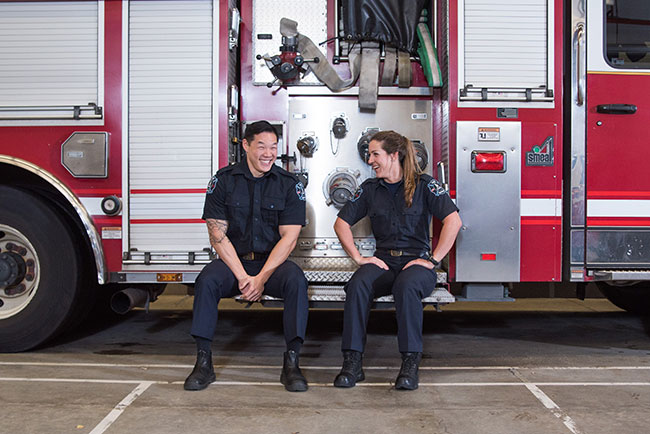
Dispatches: July 2019
By Jennifer Grigg
FeaturesSurface-level communications
 photo credit: John Lehmann
photo credit: John Lehmann If tough conversations were easy, we’d be having them all the time. We are mostly interacting on the surface level, often unwilling or uninterested to peel back the layers to see what’s hidden beneath.
If we have a question, we shoot a quick text or an email. When we’re having phone conversations, we’re usually doing something else while we’re talking. Whether we’re driving, watching television, working on our computer or surfing social media, rarely are we ever fully listening to the person on the other end of the line.
On the occasion that we’re engaged in face-to-face dialogue, we’re either doing the same as above or we’re focused on other things requiring our attention and missing out on not only what’s being said, but more importantly, what isn’t.
Conversations are often done in passing and we may or may not give them another thought. In many situations this is perfectly normal. However, in other situations it’s a missed opportunity to be the friend that someone needed.
Some might argue that this is just the world we live in, but I beg to differ. The world – our world – is what we make it. We are the ones who ultimately decide whether our conversations and interactions will be surface-level (think texting and myriad ways that a message can be misinterpreted, misconstrued, or missed altogether), or whether we’ll take or make the time and effort to dig a little deeper.
Phone calls, which may at least give you the benefit of hearing someone’s voice and can cue you to underlying concerns via their pitch, tone or cadence, are also the easiest form of communication in which to lie because there’s no paper trail and people can’t see the other person’s face if you miss those vocal cues.
Even email can convey intention and tone (either negatively or positively) but can also leave plenty of room for confusion because you lack the face-to-face interaction and personal connection.
To be clear, I’m not suggesting that every one of our conversations needs to be deeper than surface-level or that we should be pouring our heart out to the cashier at Home Depot when you’re paying for your purchase. What I am saying is that when someone shows up at the fire hall or on a call, and they’re being snippy, or reacting in a way that seems odd/excessive/confusing or downright bizarre for the situation, dig a little deeper when the opportunity exists.
We all, and I mean all, have stuff going on behind the scenes and underneath the surface that we carry with us. Not necessarily all the time for everyone, but certainly at least on one occasion or another, and for some it may be a lot more stuff and a lot more often than others.
Rather than getting your back up, look at it from a larger perspective. Take your ego out of the way and look at the facts.
- This person is a member of your fire hall or department and a member of your team. Even if you’re not the best of friends, you are in the business of helping others. You owe it to that other person, and to yourself, to dig a little deeper.
- People are not jerks by nature. If someone is being a jerk (or difficult, or defiant, or whatever the case may be) he or she definitely has something else going on.
- When the behaviour doesn’t fit the situation, that’s your cue. They might not want to talk to anyone about it, but you can at least extend the olive branch.
- You don’t have to make a huge effort and you don’t have to fix anything for them. All you have to do is ask if they’re ok or see if they want to grab a coffee.
There are so many missed opportunities to effectively communicate with others – so many missed opportunities to make things even just a little bit better for anyone and everyone you come in contact with during your day.
If you’re one of those people who is pretty much always happy and good-natured, offering up a smile and a kind gesture to friends and strangers alike, thank you for being you.
If you’re like most of us who go through our day on autopilot, I just ask that you pause for a second at some point during your future interactions – whether it be via text, email, phone or face-to-face – and ask yourself, “Is this a surface level conversation or is it an opportunity to dig a little deeper?”
Even if it is with the cashier at Home Depot.
Jennifer Grigg is a speaker, coach and mental-health advocate who spent over 20 years in the fire service. You can reach her at
jennygrigg312@gmail.com.
Print this page